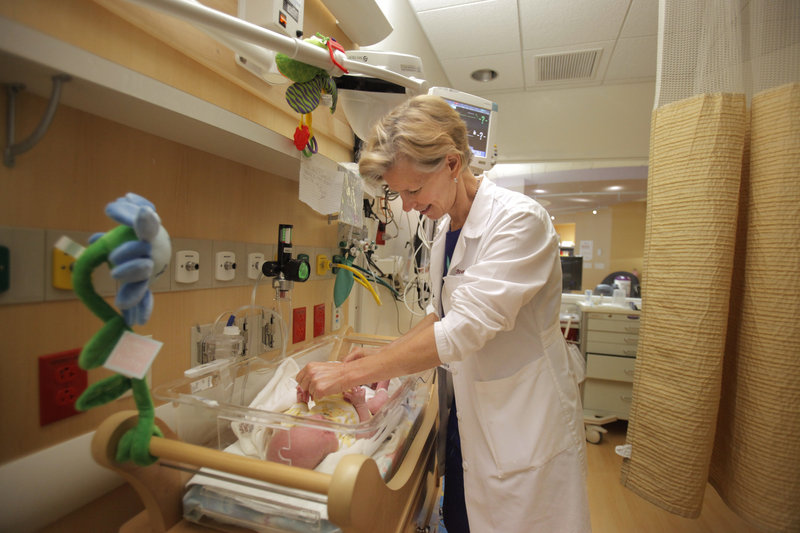The physicians who care for Maine’s growing number of “drug-affected” babies didn’t learn what to do in medical school, or from medical journals.
They figured it out for themselves.
“There is no standard of care with this,” said Dr. Brenda Medlin, a pediatrician who came to Maine Medical Center in Portland in the 1990s, when opiate-exposed babies were rare.
“The population we see is one that almost mandates that we challenge our conventional treatment,” said Dr. Mark Brown, a pediatrician and neonatologist at Eastern Maine Medical Center in Bangor who came to Maine five years ago, as the problem was exploding.
The regional hospitals in Portland and Bangor cared for nearly 300 drug-affected newborns last year — about half of those known to be born in the state.
Both hospitals use a standard scoring system to monitor at-risk newborns and determine if they are in opiate withdrawal. The symptoms typically show up two or three days after birth, starting with crying and irritability.
Sometimes, it takes several exams to rule out everything else that can cause distress for newborns. Other times, it is obvious, such as when babies stiffen up.
Technically, the babies are not addicted to opiates, but they are dependent on them. Addiction means users lose control and actively pursue the drugs to feed their habits. Withdrawal is painful either way, however.
Babies in withdrawal are fed high-caloric formula because they burn more energy and have trouble eating and gaining weight. They’re kept in quiet, darkened rooms and, as much as possible, in their mother’s arms.
At Maine Medical Center, withdrawing babies are typically given a sedative first. If symptoms continue or get worse, Medlin orders small doses of morphine.
Medlin has used methadone and a tincture of opium, but found that babies can be weaned off morphine faster and sent home sooner, she said. Babies typically continue to receive the sedatives after leaving the hospital.
A baby treated for opiate withdrawal in Portland typically stays in the hospital for two weeks, at a cost of about $25,000, according to Maine Medical Center.
At Eastern Maine Medical Center, Brown also has tried various medications, and is now using methadone. He does not prescribe sedatives for the babies, and the process of weaning off methadone takes two to four weeks in the hospital, depending on what drugs the mothers had taken, and other factors. For example, breast-fed babies tend to go home sooner than formula-fed babies, he said.
While Brown and Medlin have different approaches, they talk about what is working and what isn’t.
“It’s a big problem in Maine. We all need to be open with each other,” said Medlin.
She said she has seen some mothers come back years later, doing well and expecting another child.
“It’s a tough job. But it also is very rewarding,” she said. “There are success stories.”
Staff Writer John Richardson can be contacted at 791-6324 or at: jrichardson@pressherald.com
Send questions/comments to the editors.



Success. Please wait for the page to reload. If the page does not reload within 5 seconds, please refresh the page.
Enter your email and password to access comments.
Hi, to comment on stories you must . This profile is in addition to your subscription and website login.
Already have a commenting profile? .
Invalid username/password.
Please check your email to confirm and complete your registration.
Only subscribers are eligible to post comments. Please subscribe or login first for digital access. Here’s why.
Use the form below to reset your password. When you've submitted your account email, we will send an email with a reset code.